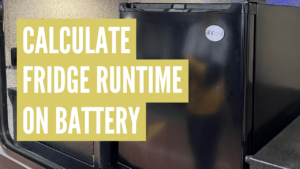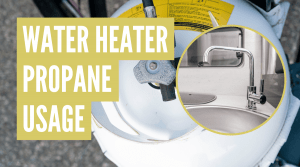To determine the size generator you need for your camper, add up the wattage of the items you plan to run simultaneously and choose a generator with at least that much power output capacity.
I break down exactly how to do this with my quick 3-step process below.
Step 1: Calculate Your Power Needs
First, calculate the wattage usage of the appliances and electronics you plan on using in your camper.
Below is a table of common camping appliances used and their estimated wattage. You can use the estimates when figuring out your power consumption, but I highly recommend you look at your specific appliances and see exactly what they use for wattage.
![]() Did you know…
Did you know…
Appliances with compressors use 2-3 times the wattage when the compressor cycles on and off. So, a refrigerator that operates at 200 running watts can take 600 watts to turn on and off. Keep that in mind when calculating the wattage of your appliances.
Tip: If your product only lists amps, then you can simply calculate the wattage using this formula: Watts = Volts x Amps. So, if you have a 10amp microwave using 120 volts, it would run at 1200 watts.
Appliance Wattage Table & Calculator
Instructions: In the “Actual Watts” column, enter that particular appliance’s watts. If you don’t know how many watts your appliance uses, you can just type in the estimated watts I provide. If you don’t use that particular appliance, skip it. And if you have an appliance not listed, use the “Other” row at the bottom. This will give you your total wattage used.
| Appliance | Estimated Watts | Actual Watts |
|---|---|---|
| Air conditioner | 2000 at startup | |
| TV | 150 | |
| Microwave | 1,000 | |
| Refrigerator | 400-600 at startup | |
| Coffee maker | 1000 | |
| Toaster | 1100 | |
| Hair Dryer | 710 | |
| Phone charger | 4 | |
| Laptop | 60 | |
| DVD player | 17 | |
| Electric blanket | 400 | |
| Space heater | 1250 | |
| Water heater | 1500 | |
| Other | 0 | |
| Total: | 0 |
If you’re struggling to find the wattage of your appliances, check the manufacturer or get a rough estimate using the Energy.gov wattage calculator.
Once you’ve filled in the wattage of all the appliances you plan on using, you’ll have a pretty good idea of your power needs.
Consider Usage Patterns
Another important consideration when determining the appropriate generator size is the usage pattern of your appliances and devices. It’s unlikely that you will be operating all of your appliances simultaneously.
Additionally, certain appliances, such as your AC unit or fridge, tend to run more frequently than others, like a blender. Taking into account the varying usage patterns of your appliances helps in accurately sizing the generator to meet your specific power needs.
Still, the wattage hogs are usually the appliances that often run or kick on automatically, so it’s best to at least have all of those covered.
Tip: If you don’t have (and don’t want to get) a generator powerful enough to run your most used appliances simultaneously, you may have to get into the habit of using certain appliances at different times. For example, after you brew your coffee in the coffee maker, turn that off, and then you can use your toaster.
Step 2: Figure Out the Size of the Generator You’ll Need
Now that we have the total wattage that your camper could use at any given time, we need to check our RV’s amp rating, which is typically a 30-amp or 50-amp.
If you’re unsure what your amperage is, you can check out our guide to determine if your camper is 30 amp or 50 amp.
But the easiest way to tell is by examining the power cord. A 30-amp cord features a three-pronged plug, and a 50-amp cord has a four-pronged plug.
Now, with that information, we can find the perfect size generator for your RV.
What Size Generator Do I Need for a 30 Amp RV?
You will typically want a 2,500 to 3,600-watt generator for a 30-amp RV. And you’ll want it more towards the higher end if it has an AC unit.
Why? A 30-amp RV can handle up to 3,600 watts of electric power. This means that a generator with a power output of 3,600 watts would be equivalent to the shore power your RV can handle.
However, it’s also important to consider usage. If the total watts you figured above is only 1,500, including start-up surges, then a 3,600-watt generator might be overkill and a waste of money.
What Size Generator Do I Need for a 50 Amp RV?
A 50-amp RV can handle up to 12,000 watts of electric power. This means that a generator with a power output of 12,000 watts should be your high-end choice for a 50-amp RV. However, while some RVs may require that amount of power, most won’t need a generator of that size. A good 50-amp RV generator is sized to meet and slightly exceed your power needs, as calculated above.
Step 3: Find the Perfect Generator
Now that you know the size of the generator you need for your camper, it’s time to find a reliable model that will fit your needs.
However, with the hundreds of different brands and models of generators out there, finding the best RV generator can be tricky. So, I narrowed it down to some of the most highly rated and reviewed models at different wattage and price points. Simply choose the one that best fits your power needs and financial budget!
Remember, there’s more than just wattage to consider when choosing the right generator for your needs.
You should also consider fuel type (gas, diesel, propane), whether you need a stationary or portable generator, noise level (you’ll want a quiet generator), and whether you’ll be charging sensitive electronics with it.
FAQs
Will a 3500 Watt Generator Run a 30 Amp Camper?
Yes, a 3500-watt generator will run a 30-amp camper. A 30-amp camper typically needs about 3600 watts to run at maximum capacity. However, most times, not all appliances in the camper are running at the same time. Thus, a 3500-watt generator should suffice for most needs, but it’s important to manage power usage carefully to avoid overload.
What Size Generator Do I Need for a 30-Foot Travel Trailer?
The size of the generator you’ll need for a 30-foot travel trailer will largely depend on the number of appliances you have and how often you use them simultaneously – not the length of the camper trailer. On average, a generator with a capacity of 2,500 to 3,600 watts should be sufficient to power the appliances in a typical 30-amp travel trailer. A 50-amp trailer may require more. For specific needs, add up the wattage of all your appliances to get a more accurate estimate.
Will a 2000 Watt Generator Run Camper AC?
A 2000-watt generator might run a smaller camper AC unit, which typically requires around 1500-2000 watts to start up and around 500-1500 watts to run. However, it may not have the capacity to power much else concurrently. For larger AC units (like those often found in larger campers or RVs), a 2000-watt generator might not be sufficient.
What Size Generator Do I Need for an RV With 2 AC Units?
For an RV with two AC units, you would likely need a larger generator in the range of 5000-7000 watts. This is to ensure that both AC units can run simultaneously, along with some additional power for other small appliances or lights. Again, exact needs may vary depending on the specific power requirements of the AC units and any other appliances you wish to use concurrently.
Can a Generator Be Too Big for an RV?
While there’s no such thing as a generator that’s “too big” in terms of power output, larger generators can be impractical for other reasons. They tend to be heavier and larger, making transport and storage difficult. Additionally, they can be more expensive to purchase and run, as they typically consume more fuel. Choosing a generator that meets your power needs without greatly exceeding them is best.
What Size Generator Do I Need to Run an RV Heater?
The size of the generator you will need to run an RV heater largely depends on the power consumption of the heater itself. Many RV heaters are propane-based and require electricity only for the blower fan and thermostat. Such heaters usually require between 300 to 500 watts.
However, if you’re using an electric heater, it can consume much more power. A portable electric heater can use around 1500 watts or more.
For propane heaters, a generator with 2000 watts should be sufficient to run the heater and a few other small appliances or lights. For electric heaters, you’d likely need a generator with a higher capacity.







Write a comment